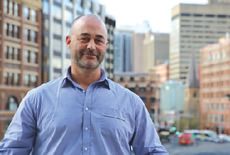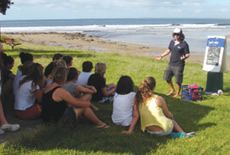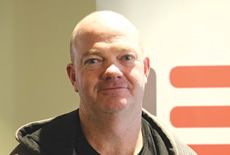Two presenters at this year’s IEU Environment Conference are using Marine Studies to raise awareness of sustainability issues with their students and inspire them to seek solutions.
This year’s conference Looking 2 Our Future on 16 October at the Mercure Sydney will focus on practical strategies for schools and early childhood centres in educating for sustainability in the context of escalating international debate and action on climate change.
The conference will provide five hours and 15 minutes registered PD for teachers towards maintaining Proficient Teacher Accreditation in NSW.
The keynote speaker Dr Mark Diesendorf will talk about transitioning Australia’s energy system from fossil fuels to renewable energy.
Professor Neil Ormerod will discuss the Papal Environment Encyclical and social justice and its impact on international climate policy, and surfer Tim Silverwood will talk about his personal decision to clean up plastics from his favourite surfing beaches and how that led to a path of scientific exploration and activism.
Teachers and IEU Council delegates Nick Blackman and Glenn Lowe will present a workshop on why and how they teach Marine Studies and Technology at their schools.
Head of TAS Glenn Lowe (pictured middle) of St Joseph’s Catholic High School, Albion Park, said Marine and Aquaculture Technology traditionally was aimed at students who may have been “a little bit disaffected” with school, but its diversity was attracting all types of students, with several of his graduates going on to study marine biology.
“It’s a diverse course which draws together the different aspects of the TAS department. We do the mandated WHS and water safety in Years 9 and 10 then we go on to fish habitat depletion and water and surf safety among other units.
“At the conference I’ll talk about what students get from it and how it allows them to grow within themselves.
“The course leads students to become more politically aware and they start asking questions and discussing environmental issues.”
IEU Rep and TAS Teacher Nick Blackman (pictured right) of Carroll College, Broulee, said the course, being non-ATAR, is very flexible and allows teachers to come up with their own units.
This year’s assessment for his group will be to present a movie night on ocean acidification. The ocean is absorbing more and more carbon dioxide from the air causing this acidification. Nick said science is only just catching up with this phenomenon.
His students are networking with the local council and environmental groups.
“The kids are ambassadors for change. It’s a win-win situation as they are empowered. It’s not all doom and gloom, they are part of the solution. It’s good for the school to liaise with the community and ultimately good for the environment.
“So much of our system is about competing against each other, but I think it’s better if the kids can learn to collaborate with each other and communicate and bring about change.”
As well as the movie night, students are preparing speeches, making displays and cooking with sustainable seafood.
“We’ve made fishing rods, as catching your own fish is the most sustainable way to eat a fish,” Nick said.
There are more details about the conference on the IEU website www.ieu.asn.au.
Early bird registration (before 1 September) is discounted. For details contact Tania Yardley on 8202 8900 or email tania@ieu.asn.au.





































































































































